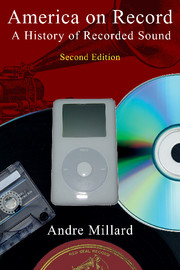Book contents
- Frontmatter
- Dedication
- Contents
- Preface to the second edition
- Preface to the first edition
- Introduction
- Part One The acoustic era
- Part Two The electrical era
- Part Three The digital era
- Abbreviations used in the notes
- Notes
- Select discography
- Select bibliography
- Subject index
- Recordings index
- Motion picture index
Preface to the first edition
Published online by Cambridge University Press: 05 February 2015
- Frontmatter
- Dedication
- Contents
- Preface to the second edition
- Preface to the first edition
- Introduction
- Part One The acoustic era
- Part Two The electrical era
- Part Three The digital era
- Abbreviations used in the notes
- Notes
- Select discography
- Select bibliography
- Subject index
- Recordings index
- Motion picture index
Summary
America on Record is an attempt to describe the technological development and cultural impact of sound recording from its inception to the early 1990s – “from Edison's phonograph to gangsta rap,” as one reviewer put it. As space is limited, I have not provided a full account of the technology or its cultural effects – I leave this to the experts – but instead a concise narrative which covers the significant events and explains the relationship of these two important forces. This is an interdisciplinary book intended for students in History and American Studies, and their pressing schedules have been uppermost in my mind during the preparation of the manuscript.
The history was written during a time of rapid technological advance, and I have no doubt that more innovations in digital sound recording will have been made before the book appears in print. I ask the reader's indulgence for sections that may appear outdated and hope that the machines described in the closing chapters have not become obsolete in the short time from manuscript to published book.
Researching and writing this book was truly a pleasure. I owe a great debt to Raymond Wyman, Professor Emeritus of the University of Massachusetts at Amherst, who not only read the manuscript several times but also gave me the benefit of his years of experience with audio visual technology. Peter Copeland, recording engineer and Conservation Manager of the British Library National Sound Archive in London, also went through the manuscript and helped me understand much of the technology. My friend Ed Pershey of the Tsongas Industrial History Center was full of his usual insights and guided me along the path to a readable book.
Several important archives were made available to me. I want to thank the staff of the Edison National Historic Site, especially Doug Tarr and Jerry Fabris; Sam Brylawski of the Recorded Sound Reference Center at the Library of Congress; Dan Morgenstern of the Institute of Jazz Studies, Newark; Emmett Chisum of the American Heritage Center at the University of Wyoming, Laramie; Dick Cooper of the Alabama Music Hall of Fame; and Tina McCarthy of the Sony/ CBS music archives, New York.
- Type
- Chapter
- Information
- America on RecordA History of Recorded Sound, pp. xi - xivPublisher: Cambridge University PressPrint publication year: 2005



